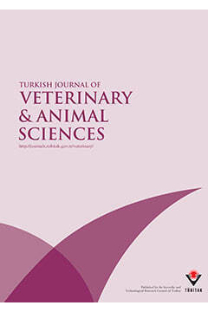The Case of Dermatosparaxis in a Lamb
This observation was to report a case of dermatosparaxsis in an Akkaraman lamb. It was performed complete necropsy. And the lesions were described macroscopically and microscopically. In addition, it was included the affected and nonaffected flock to the research. After general clinical examinations; blood, wool and feaces samples were also analysed with regard to hematological (microhematocrit, hemoglobin), biochemical (zinc and copper values in plasma and hair) and parasitological examinations. The parameters of the affected and nonaffected flock were compared with each other. As the problem occured in a closed flock, it was enhanced the earlier hypothesis that genetic factors are important in Dermatosparaxis. In addition, as plasma zinc levels were found to be low in the sheep that lambed defected animals, it was assumed that zinc deficiency may also involve to arise this genetic impairment. It is considered that future studies are to clear this problem.
The Case of Dermatosparaxis in a Lamb
This observation was to report a case of dermatosparaxsis in an Akkaraman lamb. It was performed complete necropsy. And the lesions were described macroscopically and microscopically. In addition, it was included the affected and nonaffected flock to the research. After general clinical examinations; blood, wool and feaces samples were also analysed with regard to hematological (microhematocrit, hemoglobin), biochemical (zinc and copper values in plasma and hair) and parasitological examinations. The parameters of the affected and nonaffected flock were compared with each other. As the problem occured in a closed flock, it was enhanced the earlier hypothesis that genetic factors are important in Dermatosparaxis. In addition, as plasma zinc levels were found to be low in the sheep that lambed defected animals, it was assumed that zinc deficiency may also involve to arise this genetic impairment. It is considered that future studies are to clear this problem.
